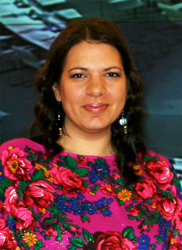|
Welcome to the website
of the movement for
Linguistic Human Rights
in the World
A place for
information, discussion
and action concerning
Linguistic Human Rights:
www.linguistic-rights.org
Lingvaj Rajtoj
Derechos Lingüísticos
الحقوق اللغوية
Droits Linguistiques
ЯЗЫКОВЫЕ ПРАВА
Linguistic Rights
语言权
언어권리
Sprachliche Rechte
Nyelvi jogok
حقوق زبانی
สิทธิทางภาษา
Diritti linguistici
Sproglige rettigheder
Jazyková práva
Taalrechten - taalrechtvaardigheid
. . .
|

|
Esperanto 1887-2012: 125 Years of
Equitable Communication Among the Peoples of the World
Rita IZSÁK
Tove SKUTNABB-KANGAS • Robert PHILLIPSON
Gerhard WALTER • Fernand DE VARENNES

Welcoming words to the UEA publication of
"125 years of Esperanto"
by Rita IZSÁK
UN Independent Expert
on minority issues
"Unity in diversity". A slogan, which describes a goal and a desirable way of life I often use when discussing minority rights with various communities while carrying out my mandate as the UN Independent Expert on minority issues. Esperanto seeks to achieve exactly that - a language that was created to overcome ethnic, national, religious and linguistic differences and to find a common platform for exchanging views and celebrate understanding between different peoples while still respecting the cultural and linguistic diversity of its speakers.
UNESCO identifies more than 6000 languages spoken globally, the majority of which can be considered minority languages and many of which are under threat. In 2012, we celebrated the 20th anniversary of the Declaration on the Rights of Persons Belonging to National or Ethnic, Religious and Linguistic Minorities. This is an appropriate moment to assess progress and challenges that still lie ahead in the protection of minority languages. Today, when we mark 125 years of Esperanto, I would like to congratulate the Universal Esperanto Association, Universala Esperanto-Asocio (UEA) on its achievements and recognize its efforts to work towards the understanding of peoples, communication democracy, and maintenance of cultural and linguistic diversity. It is for this important work that Members of the Swiss Parliament recommended UEA for the Noble Peace Prize in 2008.
In the course of my work I identified the rights of linguistic minorities as one of my key priority areas because for minorities language is a central element and expression of their identity and of key importance in the preservation of group identity. Today, significant challenges are faced by minorities in all regions who speak minority languages and wish to maintain and use them in public and private life. Linguistic minorities are frequently also national, ethnic or religious minorities and consequently the challenges that they face may be exacerbated by discrimination on the grounds of their nationality, ethnicity or religion.
Historical factors such as colonialism have had a huge global impact on languages resulting in the marginalization of indigenous and minority languages and a rapid decline in their use. The introduction of colonial languages in Africa, Asia and the Americas initiated the marginalization of native and minority languages. Colonial languages were promoted in education, administration, political life and communications. Minority and indigenous languages were often seen as backwards, a barrier to colonial hegemony, or retarding national development. Equally it can be argued that today globalization is having a direct and detrimental impact on minority languages and linguistic diversity as global communications and market places require global understanding.
It is therefore important to preserve and celebrate the thousands of minority languages, but, recalling the vision of the founder of Esperanto, also to find common ways to interact with each other and to foster friendship, peace, understanding, cooperation and interdependence of nations and peoples. I hope that Esperanto will continue fulfilling this dual role in promoting diversity and creating unity.
|
|
|
|

|
العربية | Беларуская | বাংলা ভাষা | Dansk | Deutsch | English | Español | Esperanto | فارسی | Français | Gaeilge
ελληνικά | Bahasa Indonesia | Íslenska | 한국어 | Italiano | Magyar | Nederlands | Português | по-русски
Slovenčina | Српски | తెలుగు | Türkçe | Українська | 语言权
© 2008-2018 Agado por Lingvaj Rajtoj, UEA
Reguloj pri utiligo | Privateco | Leĝe | Kontakto
traduko | informado | retejmapo

|


